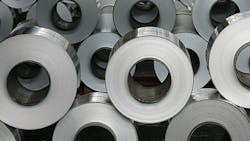Alcoa CEO Points to 'Sucking Sound' in China for Aluminum Woes
China’s huge subsidies for its aluminum makers are pulling more metal production into the Asian nation and fueling excess plant capacity, according to Alcoa Corp.’s (IW 500/100) chief, who is trying to rally government officials globally to confront the issue.
Financial support for China’s aluminum industry is “on an order of magnitude larger’’ than in other countries, distorting global supply and demand balances for the metal, Alcoa Chief Executive Officer Roy Harvey said in an interview at the company’s Pittsburgh headquarters. The country that makes over half the world’s aluminum lifted output last year to a record.
The comments come after the Organization for Economic Co-operation and Development said in a report last month that China’s “unprecedented” increase in output has fueled concerns about excess capacity that’s depressing prices “and threatening the viability of producers worldwide.” Harvey’s views also suggest U.S. tariffs alone won’t be enough curb the flow of Chinese metal.
“That playing field simply isn’t level,” Harvey said. “And that in turn means that you’re getting this sucking sound of productive capacity, and now semi-fabricated products, into China. You’re pulling more and more of that primary demand back into China, and it’s only a gain for the Chinese.”
Prices of benchmark aluminum fell 19% last year, in part because of concern that U.S.-China trade tensions would erode demand.
Demand for the metal is still “very strong,” including in the aerospace, automotive and building industries, Harvey said. And China is making progress in cutting inefficient aluminum production, but newer primary metal production operations continue to surface and production of semi-fabricated products is starting to boom in the country, he said.
Charges that China subsidizes its industries aren’t new, and U.S. frustrations with what it sees as unfair Chinese trade practices were a big driver in the Trump administration’s decision last year to impose tariffs on steel and aluminum imports. But Alcoa has called on the administration to address Chinese overcapacity directly, and is taking the case to other governments and organizations as well.
Harvey said a good example of an effective approach may be the case brought to the World Trade Organization by the Obama administration, which filed a complaint alleging Chinese subsidies to domestic aluminum producers were suppressing the metal’s price.
“One of my main jobs personally is to try to rally the forces of those countries, and those governments and those industry associations that do play by the rules, to recognize the problem, and to take actions that start to bring a market back into better balance,” Harvey said.
By Joe Deaux
About the Author
Bloomberg
Licensed content from Bloomberg, copyright 2016.
